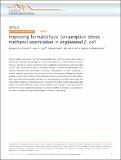| dc.contributor.author | Woolston, Benjamin Michael | |
| dc.contributor.author | King, Jason R | |
| dc.contributor.author | Reiter, Michael A. | |
| dc.contributor.author | Van Hove, Bob Walter M. | |
| dc.contributor.author | Stephanopoulos, Gregory | |
| dc.date.accessioned | 2018-11-06T13:18:19Z | |
| dc.date.available | 2018-11-06T13:18:19Z | |
| dc.date.issued | 2018-06 | |
| dc.identifier.issn | 2041-1723 | |
| dc.identifier.uri | http://hdl.handle.net/1721.1/118902 | |
| dc.description.abstract | Due to volatile sugar prices, the food vs fuel debate, and recent increases in the supply of natural gas, methanol has emerged as a promising feedstock for the bio-based economy. However, attempts to engineer Escherichia coli to metabolize methanol have achieved limited success. Here, we provide a rigorous systematic analysis of several potential pathway bottlenecks. We show that regeneration of ribulose 5-phosphate in E. coli is insufficient to sustain methanol assimilation, and overcome this by activating the sedoheptulose bisphosphatase variant of the ribulose monophosphate pathway. By leveraging the kinetic isotope effect associated with deuterated methanol as a chemical probe, we further demonstrate that under these conditions overall pathway flux is kinetically limited by methanol dehydrogenase. Finally, we identify NADH as a potent kinetic inhibitor of this enzyme. These results provide direction for future engineering strategies to improve methanol utilization, and underscore the value of chemical biology methodologies in metabolic engineering. | en_US |
| dc.description.sponsorship | United States. Advanced Research Projects Agency-Energy (Award DE-AR0000433) | en_US |
| dc.description.sponsorship | National Science Foundation (U.S.). Graduate Research Fellowship (Grant No. 1122374) | en_US |
| dc.description.sponsorship | Research Foundation-Flander | en_US |
| dc.publisher | Nature Publishing Group | en_US |
| dc.relation.isversionof | http://dx.doi.org/10.1038/s41467-018-04795-4 | en_US |
| dc.rights | Creative Commons Attribution 4.0 International License | en_US |
| dc.rights.uri | http://creativecommons.org/licenses/by/4.0/ | en_US |
| dc.source | Nature | en_US |
| dc.title | Improving formaldehyde consumption drives methanol assimilation in engineered E. coli | en_US |
| dc.type | Article | en_US |
| dc.identifier.citation | Woolston, Benjamin M., Jason R. King, Michael Reiter, Bob Van Hove, and Gregory Stephanopoulos. “Improving Formaldehyde Consumption Drives Methanol Assimilation in Engineered E. Coli.” Nature Communications 9, no. 1 (June 19, 2018). | en_US |
| dc.contributor.department | Massachusetts Institute of Technology. Department of Chemical Engineering | en_US |
| dc.contributor.mitauthor | Woolston, Benjamin Michael | |
| dc.contributor.mitauthor | King, Jason R | |
| dc.contributor.mitauthor | Reiter, Michael A. | |
| dc.contributor.mitauthor | Van Hove, Bob Walter M. | |
| dc.contributor.mitauthor | Stephanopoulos, Gregory | |
| dc.relation.journal | Nature Communications | en_US |
| dc.eprint.version | Final published version | en_US |
| dc.type.uri | http://purl.org/eprint/type/JournalArticle | en_US |
| eprint.status | http://purl.org/eprint/status/PeerReviewed | en_US |
| dc.date.updated | 2018-10-10T14:47:38Z | |
| dspace.orderedauthors | Woolston, Benjamin M.; King, Jason R.; Reiter, Michael; Van Hove, Bob; Stephanopoulos, Gregory | en_US |
| dspace.embargo.terms | N | en_US |
| dc.identifier.orcid | https://orcid.org/0000-0002-6570-2236 | |
| dc.identifier.orcid | https://orcid.org/0000-0001-6677-4576 | |
| dc.identifier.orcid | https://orcid.org/0000-0001-6909-4568 | |
| mit.license | PUBLISHER_CC | en_US |
